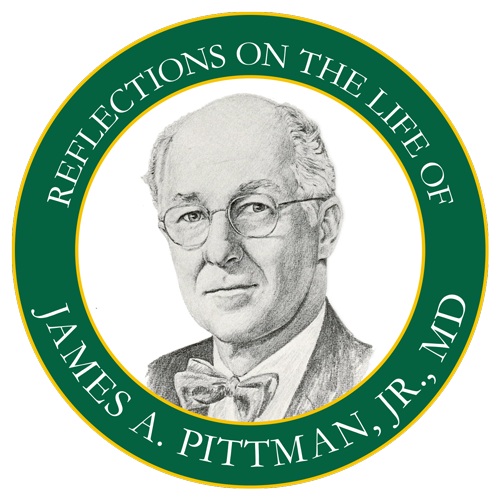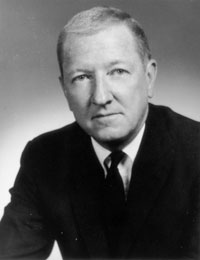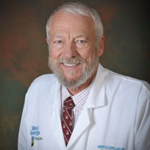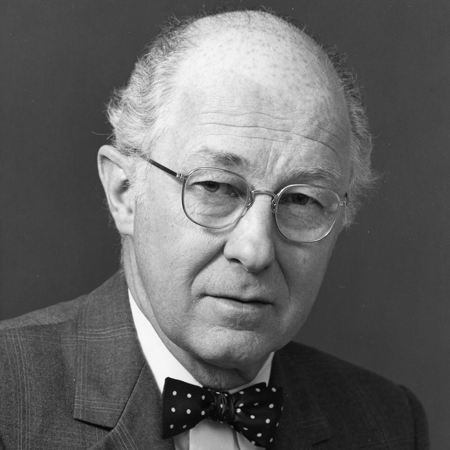
My first direct contact with Jim Pittman was in 1961, at the beginning of my third year of medical school, when I was summoned to his office in the Veterans Administration Hospital. The office was sparsely furnished and had a large gray metal desk. I remember his steel-blue eyes, his wire-rimmed glasses, his bowtie and sharply starched white coat. His manner was direct, but he was easy to talk with.
He stated that our best students were not getting matched into the best internal medicine training programs and he and some of the other Harvard-trained faculty were trying to change that. Without any further discussion, he said he wanted me to go to the Massachusetts General Hospital for a Harvard clinical clerkship during my senior year. Dr. Pittman did not know it, but a few hours earlier, my wife, Jenny, who was very ill, had given birth to premature twin boys. Her course was complicated by post-partum eclampsia and grand mal seizures. I was numb that morning, but thank goodness I did not say no to his plans. I knew Dr. Pittman must have put himself on the line for me to get into the Harvard program. I never made a phone call, wrote a letter or filled out a form. He did it all, and changed my whole life for the better.
 Dr. Walter FrommeyerThe day I left to go to Boston, I went by his office. He continued his work on a manuscript as he talked to me, telling me he wanted me to do my best, etc. I came away from that brief visit with the disturbing feeling that he did not think I would get an internship at MGH. This worried me a lot, but I finally came to the feeling that he had been there and knew well what he was talking about. I was very determined to do well.
Dr. Walter FrommeyerThe day I left to go to Boston, I went by his office. He continued his work on a manuscript as he talked to me, telling me he wanted me to do my best, etc. I came away from that brief visit with the disturbing feeling that he did not think I would get an internship at MGH. This worried me a lot, but I finally came to the feeling that he had been there and knew well what he was talking about. I was very determined to do well.
The clinical clerkship at MGH was fantastic. I loved every minute of it. I also did my internal medicine residency and a clinical and research fellowship in cardiology at the Massachusetts General Hospital. None of this would have happened without Jim Pittman’s critical role as an influential teacher and role model. He made it all possible, and I did not want to disappoint him.
But after living through several family tragedies and completing training in Boston, Jenny and I felt a strong need to come home. When I spoke with Dr. Pittman about this, he and Dr. Walter Frommeyer, then Chair of Medicine, urged me to consider working with Drs. Abraham Russakoff or Keehn Berry in Birmingham. Instead, I chose to practice in the small southern town of LaGrange, Ga., 135 miles away. Dr. Pittman did not comment on my choice. I felt again, as I had on turning down opportunities and leaving the MGH, that I was cutting a vital lifeline.
However, Dr. Pittman stayed in touch. I never knew exactly how Jim Pittman kept up with me, but with significant milestones, he always seemed to call or write me. His phone calls always included, “What are you reading” or “What have you read lately?” Invariably the next question was “What do you think about it?” He sent me at least one book yearly, usually with notes on the margins and key statements underlined. We came to share a love of history and we both were big fans of Sir Winston Churchill. Dr. Pittman called me when I was made a member of the Board of Governors of the American Board of Internal Medicine and later when I was named to the Board of Directors of the Joint Commission for the Accreditation of Healthcare Organization. He wrote me a long letter when I became a member of National Academy of Science Institute of Medicine, commenting on how unusual it was for a private practice physician to be there.
All the leading people in these august organizations seem to know and greatly respect Jim Pittman. In the 1970s, my old chief, Alex Leaf, Jackson Professor of Medicine at Harvard and Chief of Medical Services at MGH, came to visit me in LaGrange. I knew he and Dr. Pittman were Boston friends, so I called to tell him Dr. Leaf was to be at my home and that we were having a small afternoon reception for him. “I want to come,” he was quick to say. “I’ll fly over.”
He flew his Stearman to LaGrange, bringing along his 12-year-old son. Well before sundown, Jim Pittman took me aside and informed me he had to leave soon because he often navigated by following railroads, thus he had to be back in Birmingham before dark. I don’t know if he had a radio on that ancient plane or not, but I doubt it.
In the 1970s, I developed a program for students to live in LaGrange for a month working with inpatients and outpatients of my practice, the Georgia Heart Clinic and the West Georgia Medical Center. Jim Pittman was interested in this unique program and visited it, as did Dr. S. Richardson Hill, Dr. John Kirklin and others from UAB. The Georgia Heart Clinic later provided funds for a part-time UAB cardiology fellow in LaGrange, and we had a Visiting Professor program. When I visited UAB, I always went by Dr. Pittman’s office to see him. His office at the Center for Advanced Medical Studies remains vivid in my memory: patrician physician leader surrounded by his beloved books.
I was on a UAB Department of Medicine External Advisory Committee for about 10 years, including the later years of Dr. Pittman’s deanship, along with such luminaries as Holly Smith, Don Friedrickson, Leroy Hood and Sam Thier. While there was some carping about Dean Pittman reigning but often refusing to rule, he was universally respected by all the members of that committee. To me, he was a gentle giant.
In the late 1990s, our contacts became less frequent. He called me when I became a regent of the American College of Physicians and later when I became Chair of the Board of Regents. The last book he sent me was in 1999; it was about Churchill. He wrote a note in it that means the world to me.
 Robert B. Copeland, MD, is Medical Director of the Georgia Heart Clinic in LaGrange, Ga., and is Clinical Professor at the Emory University School of Medicine and at UAB. He received his MD degree from the Medical College of Alabama, later named the School of Medicine at UAB, in 1963. Postgraduate training included an internship, residency, and fellowship at Massachusetts General Hospital.
Robert B. Copeland, MD, is Medical Director of the Georgia Heart Clinic in LaGrange, Ga., and is Clinical Professor at the Emory University School of Medicine and at UAB. He received his MD degree from the Medical College of Alabama, later named the School of Medicine at UAB, in 1963. Postgraduate training included an internship, residency, and fellowship at Massachusetts General Hospital.